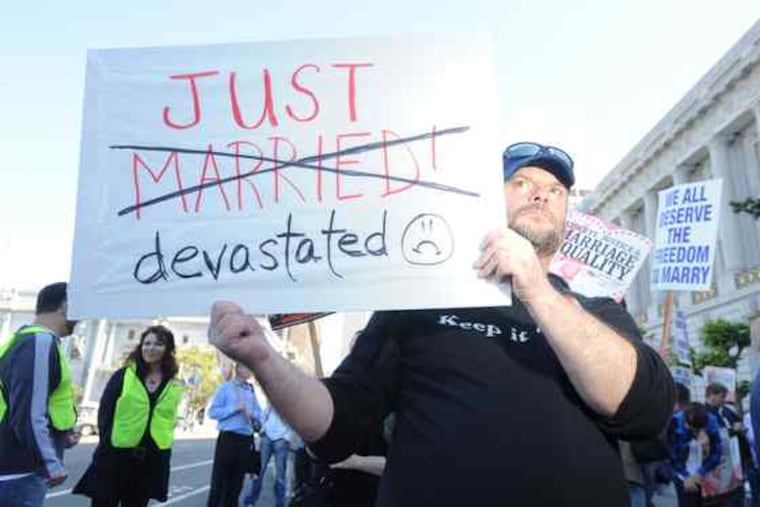There's a word for what Prop 8 limits
If somebody had told me just a few years ago that a decision saying that gay couples in California are entitled to every right and protection of marriage other than the name would be considered a major loss, I probably would've laughed.

If somebody had told me just a few years ago that a decision saying that gay couples in California are entitled to every right and protection of marriage other than the name would be considered a major loss, I probably would've laughed.
It wasn't so long ago that even moderate Democrats were fudging about the permissible differences between domestic partnership and marriage, and the big issues were things like getting health coverage and avoiding homophobic judges who would take away custody from parents who lived with same-sex partners. President Obama, while opposing California's Proposition 8, said he believes that marriage is between a man and a woman.
The California Supreme Court's decision to uphold Prop 8, which limits marriage to a man and woman and overturns the earlier court decision to the contrary, was reached on the narrowest possible ground.
The court did not hold that the state constitution should henceforth be understood to recognize that gays are different in ways that would justify differential treatment in fact. It did not declare open season on discrimination. Not even close. Rather, the justification for upholding Prop 8 as a permissible amendment to the constitution and not an impermissible revision of it (which would require more than a simple majority support for a referendum) was how little it accomplished, not how much.
The court found that Prop 8 did not limit "the constitutional right of same-sex couples to 'choose one's life partner and enter with that person into a committed, officially recognized and protected family relationship that enjoys all of the constitutionally based incidents of marriage.' Nor does Proposition 8 fundamentally alter the meaning and substance of state constitutional equal-protection principles as articulated in that opinion.
"Instead, the measure carves out a narrow and limited exception to these state constitutional rights, reserving the official designation of the term marriage for the union of opposite-sex couples as a matter of state constitutional law, but leaving undisturbed all of the other extremely significant substantive aspects of a same-sex couple's state constitutional right to establish an officially recognized and protected family relationship and the guarantee of equal protection of the laws."
Only the word marriage differentiates future same-sex unions in this state: "among the various constitutional protections recognized in the Marriage Cases as available to same-sex couples, it is only the designation of marriage - albeit significant - that has been removed by this initiative measure."
Words matter. Marriage obviously means something, or folks wouldn't be fighting so hard to restrict access to it. The fight will continue in California. The only question is how long it will take to collect the next batch of signatures (not long, certainly) and which particular election to target for the next round. Litigation will continue in other states and in the federal courts. The issue is not going away.
Last week's decision is a temporary setback in a movement whose end point, even now, seems clear. The 18,000 gay couples who married in California before the passage of Prop 8 are still married. For the time being, other couples may commit and enjoy all the privileges and responsibilities of marriage, as long as they don't ask the state to call them "married."
Eventually, Prop 8 will be overruled, by a court or by the voters or by both, and someday, in the not too distant future, we will look back and wonder why this took so long and seemed so difficult. Considering where this issue was just a few years ago, it is a measure not of the slowness of change, but just the opposite.